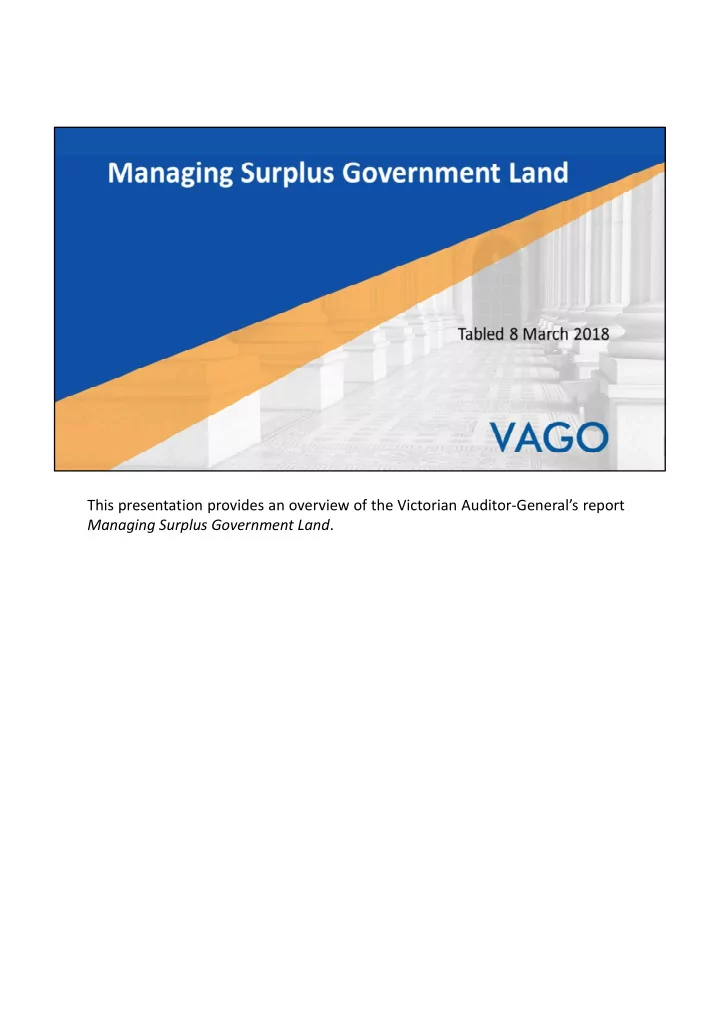

This presentation provides an overview of the Victorian Auditor ‐ General’s report Managing Surplus Government Land .
The sale of public land generates significant revenue for government and attracts strong community interest. To meet the challenges of Victoria’s growing population and increasing demand for government services, the government should make best use of its land.
This audit examined whether: • systems and targets used by agencies support the best use of surplus land • agencies accurately identify surplus land and release it for sale in a timely way, and • whether agencies can demonstrate value from the sale of surplus land.
In this audit we looked at a selection of landholding agencies and agencies implementing the government land policies including: • the Department of Treasury and Finance (DTF) • the Department of Environment, Land, Water and Planning (DELWP) • the Director of Housing which is part of the Department of Health and Human Services • the Department of Education and Training, and • Victorian Rail Track.
We found that it is difficult for agencies to make sound decisions about future land use because the existing data on landholdings is inaccurate and incomplete. In particular, there is the potential for missed opportunities because government agencies do not know how much of their land is currently under ‐ or partly ‐ utilised. DELWP is in the process of addressing these data gaps and improving its land management systems.
To support whole ‐ of ‐ government strategic land management DELWP established Land Use Victoria (LUV). LUV is improving access to information about government land use, by creating Govmap—an online tool that brings together a range of datasets on government land which are currently held in different systems by different agencies.
Current policies emphasise the financial value of land and do not provide guidance to agencies on how to achieve best value. LUV has developed the Victorian Government Land Use Policy and Guidelines, which includes a new definition of ‘public value’ designed to improve whole ‐ of ‐ government decision ‐ making about government land use.
The systems and processes used to manage surplus land do not support a strategic, whole ‐ of ‐ government approach to achieving best use. A necessary step to sell Crown land is the Strategic Crown Land Assessment (SCLA) process which determines whether surplus Crown land sites have any public values. We found that the time DELWP takes to complete SCLAs is increasing, leading to potential inefficiencies and wastage of resources.
The first right of refusal (FROR) process requires agencies to offer surplus land to other state, local and Commonwealth government agencies before public sale. We found that the FROR process does not maximise the opportunity of retaining surplus land within government, and few agencies or local councils purchase sites through the FROR process.
Until recently, rezoning was the largest impediment to the timely sale of surplus land. Since the establishment of the Fast Track Government Land Service (FTGLS) in 2015, the time frame for land sales requiring rezoning has reduced significantly, leading to improved efficiencies and savings.
Contamination poses environmental and health risks, and increases the cost of preparing surplus land for sale. We found that government agencies are not maximising value from contaminated surplus sites.
Land sale targets assigned to agencies are not evidence ‐ based and encourage agencies to prioritise the sale of surplus land rather than considering whether another option would achieve better value.
We made two recommendations for DTF to develop advice on land sales targets and incentives, and work to expedite native title consents. We made four recommendations for DTF and DELWP to: • review all land management policies • expand land utilisation categories • develop guidance on leasing, and • review the FROR process. We made five recommendations for DELWP to: • develop guidance on contaminated and low ‐ value sites • assess contamination risks, and • address delays with SCLAs. And we made two recommendations for land ‐ selling agencies to assess costs and benefits and consistently use the FROR process. All agencies have accepted the recommendations.
For further information, please see the full report of this audit on our website, www.audit.vic.gov.au.
Recommend
More recommend